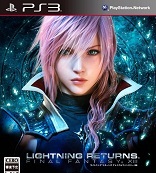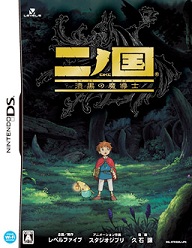ZHP: Unlosing Ranger Vs Darkdeath Evilman
PlayStation Portable
Reviewed: 11/23/2010
It’s pretty easy to tell that ZHP and Disgaea were developed by the same people; someone might even mistake one for the other in some cases. That’s not a bad thing, though. The visuals and music both serve their purposes well enough. In fact, in the case of the humerous 8-bit style of the battles against Evilman, they subtly add quite a bit. The music does a great job of staying in the bakground and complimenting the gameplay, never getting annoying. The graphics, meanwhile, are finely suited for Nippon Ichi’s trademark brand of over-the-top storytelling.
And what a story this game tells. The game begins like something straight out of an episode of Axe Cop, with a super hero called the Unlosing Ranger being late help the super baby save the world. In his rush to aid the baby, he unceremoniously gets nailed by a car and, still looking out for us all, hands his powers off to the closest bystander. Players then take control of this new hero and promtly get their asses kicked. Thus, it’s off to the parallel universe where defeated heroes are trained to beat the supervillains that oppose them. Of course, right? I…wait, what? Question: whyyy is any of this happening, again? It doesn’t matter, and really, that’s the fun of it. If you think too hard about it, your head will spin. The best way to take in ZHP‘s story is to just sit back and let the smiles come. The ridiculous plot and NIS America’s humorous translation will take care of the rest.
While in the Bizzaro world, time on Earth is pretty much on hold, allowing the player to plunge into various dungeons in an attempt to gain strength and finally beat Evilman. It’s kind of like in Braid, how the guy is definitely going to fall to his death, but then you can just rewind time and not duff that jump. It’s kind of like that. In this way, the Unlosing Ranger will keep going through dungeons, facepunching countless minions and the bosses whome they obey, and then taking another run at Evilman. When the Unlosing Ranger inevitably…loses, it’s time for more dungeons. Herein lies the real fun of the game, of course.
ZHP, at its core, can be put in the RPG subgenre of Roguelike. If you know what that means, skip this paragraph. Many gamers, even in this day of intertrons letting us share information instantly and show each other our ugly freaking faces over Xbox Live, Faceblog, Tweeter, and Smarties phones, are still unaware of this even being an actual type of game…like with other, similar games in it. Rogue was an early 80’s PC dungeon crawler that was infamously difficult due to factors that are either absent from other RPGs altogether or far less common within them, such as brutal traps and the possibility of dying of hunger. Its punishing difficulty and bigger impact of pure luck left many frustrated, but others found exhileration in the play style. Modern examples of a Roguelike include the Shiren the Wanderer series, Izuna, and Pokemon Mystery Dungeon. The character, often solo, heads into a dungeon usually bringing only a few items, as inventory space tends to be limited. Death will come more easily here than in most RPGs, both due to generally higher difficulty and far less forgiving traps. Whenever the player moves, so do on-screen enemies. Usually, a character can either move or take an action, and enemies will do the same. Dying often costs the player all of his items, money, and/or experience. Some are more punishing than others, even featuring permadeath. So with that out of the way….
The ZHP system of play takes the foundation of a modern Roguelike and dumps a bucket of Nippon Ichi on it. The dungeons and movement within them are classic Roguelike. Every time the Ranger takes a step, so will the enemies; when he takes a swing, they’re doing so too. Back at the base camp, the Ranger’s got a safehouse in which he can keep some money and items he doesn’t want to disappear when he dies. Many of the dungeons will have to be attempted a number of times, but each time, the player is more likely to succeed, as the Ranger keeps his experience from unsuccessful runs. So, deciding when to stop holding back and bring the big, badass spear and really try and kill that boss is cause for nerves and excitement. It sounds less fun than it actually is, because there’s not much else like it.
Really, in other games, there might be a lot of dying followed by trying again, but this is a pretty funny way to go about it, embracing death rather than making it the end. The Ranger isn’t starting over from a save point, just at the dungeon entrance, stripped of his cash and gear, but maintaining the EXP for another crazy run. Inconvenient as it might sound on paper, dammit, assembling some crap and making another try gets surprisingly fun. It makes no sense. That shouldn’t be fun…and yet, here we are. It does help that another (presumably hilarious) shot at Evilman at the end of the tunnel and there will frequently be some enjoyable banter between characters mixed in.
Successfully finishing a dungeon lets the hero keep the items and money as well the EXP he gained. He can then modify weapons and armor, or buy chip implants that power him up in other ways. It’s in customization elements like this and others where ZHP exceeds Roguelikes before it. Combat is equally fresh, taking the Rogue formula and adding long-range weapons (somewhat uncommon in these games) and the ability to throw off all kinds of crazy stuff. Almost feels a bit Disgaea-ish at times — but only briefly.
The ongoing evolution of the Ranger is the central theme of the game, and there are positive as well as negative aspects to this. What the player has to watch out for is dying in the same way or to the same monster, because that will cause the Ranger to develop a phobia. Consequences of a phobia result in monsters of that type being stronger than usual, until the player can fight through the fear and defeat some enemies of that type. This human element is quite interesting and actually works up quite a fun sense of vengence in the player. Nothing like being stamped with a phobia to remind you who yo daddy is.
But heaven forbid that yo actual, real life daddy should drop by for a visit or something, because ZHP does not take well to the PSP being turned off. For some reason, once in a while, the game will not recover well from sleep mode during a dungeon run. I looked into this early on, to see if it was just me, and it appears others have had this problem as well. During a dungeon run, flicking the PSP into sleep mode usually goes without incident, but sometimes — just sometimes — the game counts it as a death for some reason. Odd. So just be careful about that and when possible, avoid going into a dungeon you might not have time to finish.
It’s sad that more people aren’t quite into this type of RPG, because ZHP really deserves high praise and apprecition for what it does here. It takes a genre notorious for its crazy amount of deaths and makes it a heck of a lot more friendly for the general public. It’s certainly not a walk in the park, though, which is great. It’s somewhere comfortably between Shiren and Pokemon Mystery Dugeon, and most important of all, it’s fun to play. It’s exciting to customize the Ranger, it’s funny to watch the fights against Evilman at the ends of chapters, the dialogue is amusing, and the graphics and music are types which had not yet been used in a Roguelike. Those who have never played a Roguelike would do well to start with ZHP: Unlosing Ranger Vs Darkdeath Evilman, and those who have (and liked it at all) will be amazed by it. In 2003, Nippon Ichi gave tactical RPGs a swift kick in the ass with Disgaea. In 2010, it has given Roguelikes the same treatment with Zettai Hero Project.
-Heath Hindman
| Score Breakdown | ||
| Overall Great Out of 10 See our Review Criteria |
Gameplay | Excellent |
| Story | Very Good | |
| Graphics | Average | |
| Sound/Music | Average | |
| Replay Value | Below Average | |
| The Verdict: Great | ||


















